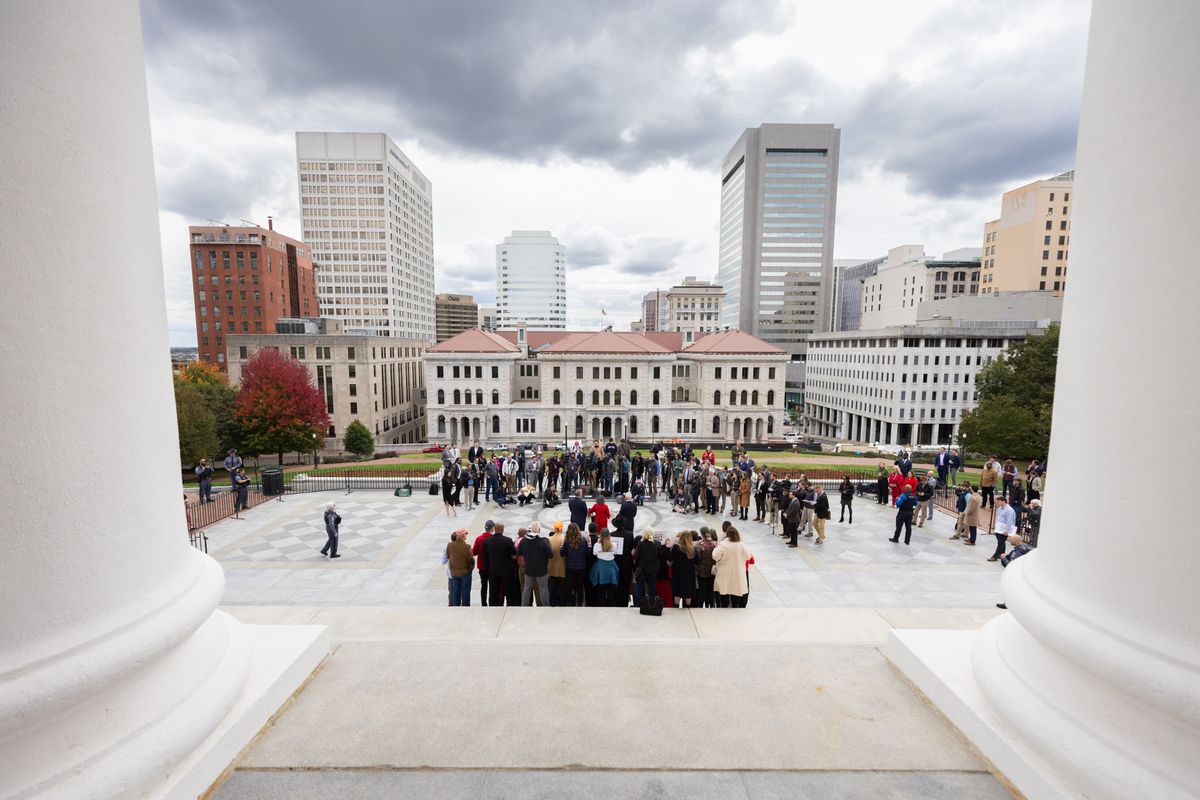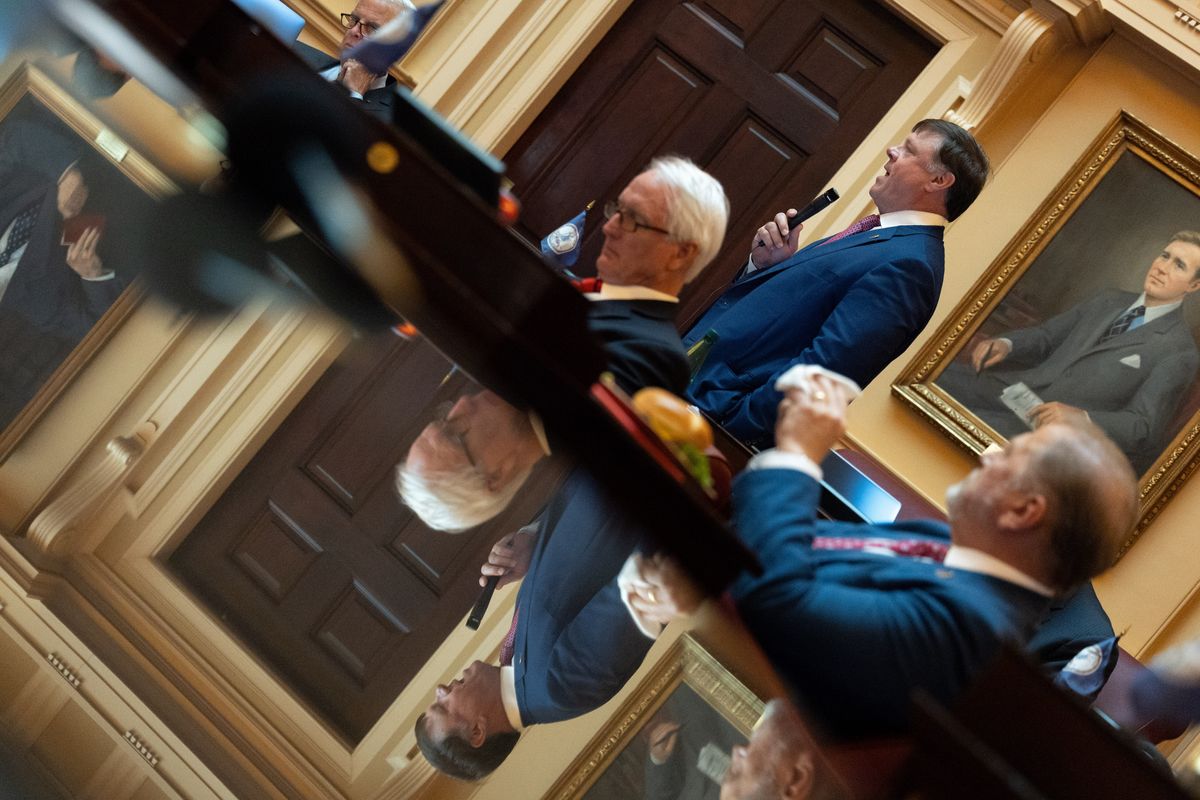Republican lawmakers in Louisiana and Democrats in Virginia pressed ahead Wednesday with plans that could allow mid-decade redistricting as part of a growing national battle for partisan advantage in next year’s congressional elections.
Louisiana lawmakers passed legislation pushing back the state’s 2026 primary elections by a month — a move that could give lawmakers extra time to redraw the state’s U.S. House districts if the Supreme Court strikes down the current boundaries.
Meanwhile, Virginia’s House endorsed a proposed constitutional amendment that, if ultimately approved by voters, would allow lawmakers to temporarily bypass a bipartisan redistricting commission and redraw congressional districts in response to similar efforts in other states.
President Donald Trump triggered a redistricting fray this summer by calling upon Republican-led states to take the unusual step of redrawing House districts to their advantage ahead of the midterm elections. Redistricting typically occurs once a decade, immediately after a census. But Trump hopes that redistricting now can help Republicans in next year’s elections hold on to the House, where Democrats need to gain just three seats to win control and impede Trump’s agenda.
Republicans in Texas, Missouri and North Carolina already have revised districts at Trump’s urging, and Indiana’s Republican governor has announced a special session on redistricting. So far, California is the only Democratic-led state to counter with a new congressional map, which is going before voters in a Tuesday election.
Louisiana delays elections for potential redistricting
Legislation delaying Louisiana’s congressional primary from April 18 to May 16 passed along party lines Wednesday during a special session and is expected to be signed by Republican Gov. Jeff Landry.
While Louisiana’s election dates have been adjusted before due to hurricanes, this change is in anticipation of a Supreme Court ruling in a potentially far-reaching redistricting case. At issue is Louisiana’s six-district congressional map, where lawmakers created a second majority-Black district in response to a previous court ruling, ultimately flipping a reliably Republican seat to Democrats.
Proponents of the current map say it offers fair representation for Black residents, who comprise one-third of the population. Opponents contend the second Black majority congressional district was unconstitutionally gerrymandered based on race.
During arguments, the Supreme Court’s six conservative justices appeared inclined to effectively overturn the district boundaries. It’s unclear when a ruling will come.
Virginia Democrats eye a path to more House seats
A new congressional map could allow Virginia Democrats to expand their current 6-5 edge over Republicans. But that requires a multistep process, because a voter-approved constitutional amendment places redistricting in the hands of a bipartisan commission.
After the 2020 census, that commission deadlocked, so a court imposed districts that remain in use. The Virginia House on Wednesday voted for a proposed constitutional amendment allowing lawmakers to draw new districts in response to mid-decade redistricting elsewhere. To make the statewide ballot, the proposal still needs Senate approval, then must be approved by both chambers again in another legislative session.
“We’re here to defend against the power grab” by Trump, Democratic Del. Marcus Simon said.
But Republican Del. Chris Obenshain decried the amendment as a “power grab” by Democrats and “a frightening attempt to resurrect a Frankenstein’s monster of gerrymandering.”
Democrats haven’t unveiled plans for how those new districts would be shaped.
A Republican lawsuit contends the special session on redistricting violates the state constitution.
Indiana isn’t ready to start its special session
Republican Gov. Mike Braun called for a special session on congressional redistricting to begin next Monday. But House Speaker Todd Huston said Thursday that the chamber is still working on a schedule and won’t convene Monday.
A spokesperson for Indiana Senate Republicans said the Senate also is unlikely to be ready next week. Under state law, the Legislature has 40 days from Monday to complete a special session.
Mary
land’s Senate refuses to take up redistricting
Democratic Senate President Bill Ferguson said his chamber won’t move forward with redistricting, even though Democratic Gov. Wes Moore and Democratic House Speaker Adrienne A. Jones have expressed interest in it. Maryland Democrats already hold a 7-1 edge over Republicans in the U.S. House.
Ferguson wrote in a letter Tuesday night to Senate Democrats that a redistricting effort aimed at flipping a seat held by Republican Rep. Andy Harris could jeopardize other seats now held by Democrats and prompt more Republican-led states to retaliate with redistricting.
“In short, the risk of redrawing the congressional map in Maryland is too high, making the unlikely possibility that we gain a seat not worth pursuing,” Ferguson wrote.
He noted that a congressional map adopted in 2021 was ruled unconstitutional by a judge who described it as “a product of extreme partisan gerrymandering.”
Maryland passed another map in 2022, and the parties dropped their legal fight. Redrawing districts again could prompt a new legal challenge and allow a court to impose districts, Ferguson wrote. Five of the seven Maryland Supreme Court judges were appointed by Republican former Gov. Larry Hogan.
Moore and Jones both said Wednesday that they hope to continue redistricting discussions.
Illinois lawmakers remain reluctant to redistrict
Despite pressure from national leaders, Democrats in the Illinois General Assembly say they won’t take up redistricting while in session this week. They left open the possibility to do so later.
Democrats hold 14 of the state’s 17 U.S. House districts, which were drawn to favor Democrats after the 2020 census. The Democratic Congressional Campaign Committee said it provided a proposed new map to legislative leaders that could allow Democrats to win an additional seat.
U.S. House Minority Leader Hakeem Jeffries met Monday with Democratic state lawmakers about redistricting, and the state’s Democratic Congress members released a statement urging consideration of a new map.
But some lawmakers remain concerned that redrawing districts could weaken representation for Black voters.
“We have to remind folks that those lines aren’t just political boundaries,” Democratic state Rep. Kam Buckner said Wednesday. “They are the visible record of invisible battles; they represent neighborhoods that finally got a voice after a century of being spoken for instead of behind heard.”
___
Lieb reported from Jefferson City, Missouri; Cline from Baton Rouge, Louisiana; Witte from Annapolis, Maryland; and Diaz from Richmond, Virginia. Isabella Volmert contributed from Lansing, Michigan.
By DAVID A. LIEB, SARA CLINE, BRIAN WITTE and OLIVA DIAZ
Associated Press




